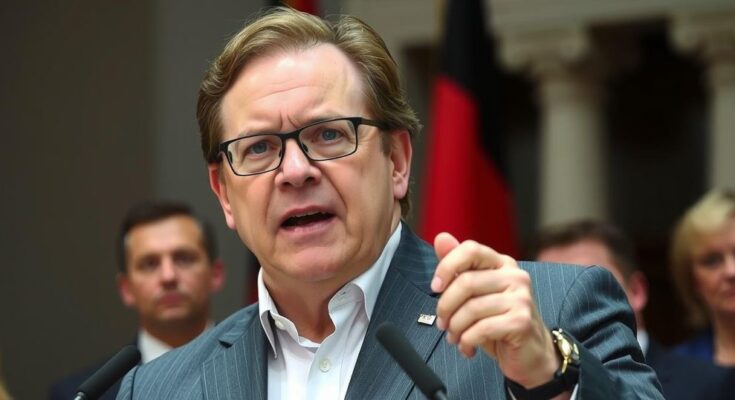Chancellor Olaf Scholz has initiated a vote of no confidence as his coalition in Germany collapses, seeking early national elections. The dissolution of the government, mainly due to financial rifts with the Free Democrats, places Scholz’s party in a fraught position during a significant economic downturn. Scholz and challenger Friedrich Merz engage in heated debates over fiscal management and future visions for Germany, raising critical concerns ahead of the scheduled elections on February 23.
In a bold move, Chancellor Olaf Scholz has called for a vote of no confidence in himself in the German parliament, aiming to pave the way for early national elections following the collapse of his coalition government. The disintegration was initiated by the exit of the Free Democrats over financial disagreements, which has left Scholz’s Social Democrats and the Greens in a vulnerable position amid rising economic challenges in Germany.
Currently, Germany is facing a critical economic crisis exacerbated by rising energy costs and the impact of geopolitical tensions, particularly due to Russia’s invasion of Ukraine. As the situation unfolds, Scholz finds himself in a contentious battle with conservative opponent Friedrich Merz, who accuses the chancellor of failing to present a viable vision for Germany’s future. The tense political atmosphere has escalated exchanges between the two leaders, each questioning the other’s capabilities and judgment.
Scholz has defended his administration, pointing to the steps taken to mitigate the financial repercussions of the ongoing economic crisis. He argues for significant investments in Germany’s infrastructure should he remain in office, while criticizing Merz’s approach towards austerity measures. Conversely, Merz has rebuked Scholz’s spending policies, characterizing them as reckless and detrimental to future generations, thus intensifying the debate surrounding Germany’s fiscal cap. Additionally, the uncertainties surrounding Scholz’s potential role as a caretaker leader following the vote, with elections scheduled for February 23, complicate the political landscape further.
The political turmoil in Germany stems from the recent collapse of Chancellor Olaf Scholz’s ruling coalition, primarily caused by the Free Democrats’ departure over diverging financial perspectives. As Scholz calls for a vote of no confidence, this watershed moment embodies the deep divisions and escalating discontent within German politics. The looming economic crisis adds pressure, compelling leaders to address pressing issues such as energy prices and fiscal policies amidst a shifting political environment, marked by frequent adversarial encounters.
Chancellor Olaf Scholz’s request for a no-confidence vote exemplifies the ongoing political strife in Germany, catalyzed by the fragmentation of his coalition. As the competing agendas of Scholz and Merz clash amid a troubling economic backdrop, the outcomes of these exchanges will significantly shape Germany’s political future. With elections nearing, the implications for governance and policy direction remain precarious, necessitating decisive action to restore public confidence and stabilize the nation.
Original Source: www.devdiscourse.com




